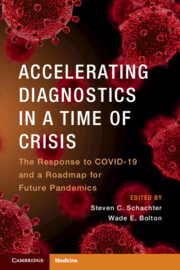 Accelerating Diagnostics in a Time of Crisis
Accelerating Diagnostics in a Time of Crisis Published online by Cambridge University Press: 06 January 2024
Severe acute respiratory syndrome coronavirus 2 (SARS-CoV-2) evolution has given rise to new variants: viruses with different sets of mutations, some of which have increased transmissibility and immune escape. Detecting and monitoring new variants was made possible by intensive, global genomic surveillance efforts, including sequencing over 1.2 million SARS-CoV-2 genomes in the first pandemic year. Crucial to these efforts was the Rapid Acceleration of Diagnostics (RADx®) Variant Task Force, which was established in 2021 to monitor variants and assess the efficacy of RADx technologies against new variants. Major accomplishments of the RADx Variant Task Force include the establishment of the ROSALIND Diagnostic Monitoring system to identify mutations, the creation of an extensive biobank of sequenced samples, laboratory testing of RADx technologies against new variants as they emerged, and epitope mapping to identify mutations likely to affect an assay’s performance. Key lessons learned include (1) the need for very early establishment of pathogen sequencing, analysis, and data sharing; (2) the importance of both in silico and wet laboratory assessment of diagnostic assays; and (3) the benefits of interdisciplinary collaboration of government, academia, and industry.
To save this book to your Kindle, first ensure no-reply@cambridge.org is added to your Approved Personal Document E-mail List under your Personal Document Settings on the Manage Your Content and Devices page of your Amazon account. Then enter the ‘name’ part of your Kindle email address below. Find out more about saving to your Kindle.
Note you can select to save to either the @free.kindle.com or @kindle.com variations. ‘@free.kindle.com’ emails are free but can only be saved to your device when it is connected to wi-fi. ‘@kindle.com’ emails can be delivered even when you are not connected to wi-fi, but note that service fees apply.
Find out more about the Kindle Personal Document Service.
To save content items to your account, please confirm that you agree to abide by our usage policies. If this is the first time you use this feature, you will be asked to authorise Cambridge Core to connect with your account. Find out more about saving content to Dropbox.
To save content items to your account, please confirm that you agree to abide by our usage policies. If this is the first time you use this feature, you will be asked to authorise Cambridge Core to connect with your account. Find out more about saving content to Google Drive.